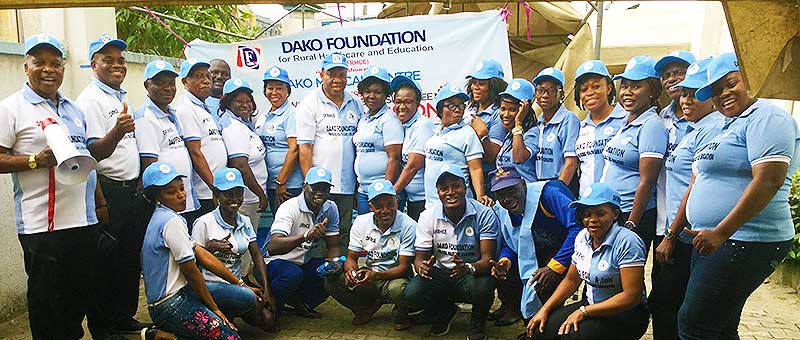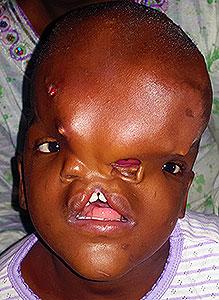
Background
Here is the inspiring story of Dr. Mamudu Dako and the background to Dako Foundation.
 Dr. Mamudu Dako was born in Iyerekhu, South Ibie in Edo State of Nigeria in the late 1950s. This is a rural community where essential amenities were either absent or in a poor state. As a child, he combined school with farming and hunting with his father. This was not an uncommon thing to do among most children of his age at that time in this agrarian rural community.
Dr. Mamudu Dako was born in Iyerekhu, South Ibie in Edo State of Nigeria in the late 1950s. This is a rural community where essential amenities were either absent or in a poor state. As a child, he combined school with farming and hunting with his father. This was not an uncommon thing to do among most children of his age at that time in this agrarian rural community.
The primary school in the community was one of the few buildings roofed with corrugated iron sheets as most of the buildings were roofed with raffia palms sheets. Daily routine for him was to wake up at about 5.00 am in the morning, rush to fetch water from the stream which was about five Kilometers away, get home early enough to do the house chores, and prepare for school. The school lasted from 8.00 am -2.00 pm after which he would either go to the farm to join his parents or go with some of his peers to cut palm nuts. During the holidays and some weekends, it was not unusual for him to accompany his father on a hunting expedition to the forests in communities that were more rural than their own. It was fun having this routine as they did not know there was life more rewarding and entertaining. The rural people respected his family as they were seen as successful farmers and great hunters.
The teachers in this school were even less exposed than the average illiterate uninformed parents. They never encouraged their pupils to progress beyond primary education and so progressing beyond this level was rare.
Human waste was openly disposed of as only a few homes had pit latrines. Drinking water was obtained from an openly polluted stream and about half a dozen of shallow wells. There was no health facility. Wounds were cleaned with warm water and penicillin powder spread on them. There were a few untrained “dispensers” who injected multiple people with the same needle and syringe; thank God HIV/AIDS and Hepatitis infections were not endemic to the region at the time. The nearest dispensary was about five Kilometers away at Ibienafe and the road was torturous and narrow; people had to trek there when necessary because bicycles were few in the community and motorcycles and vehicles were not available. There was no electricity!
Our cover picture taken in a “rural-urban” community in Lagos shows what rural life is like. In this ” Urban rural” community, you can see a solid wall separating the affluent city community from the rural slums. The wooden dangerous bridge to this community speaks volumes. Wares, including food, are openly displayed and a family unit which often includes a man with two or more wives and many children lives and sleeps in a one-room apartment. People defecate into the canal in front of the “supermarket and their drinking water is from a shallow well.
More than forty years after he left the village for urban areas for higher education and to work, his visits to rural communities in both remote areas and urban areas showed that things have not changed! While social services, education, and healthcare are improving at a geometric ratio in the cities, they are either not available in rural communities or are in a very sorry state. The authorities, usually in the cities, do not care much about these people because they are not directly affected. They only remember them during elections. Personnel are not willing to work and/or live in these communities because of the absence of social amenities.
He also observed that the poorer or more disorganized a central government is, the poorer its rural community. National economic depressions have greater negative impacts on our rural communities.
Dako Foundation for Rural Healthcare and Education started its activities in 2008 to address these imbalances in societies through advocacy, empowerment, and direct intervention in health and education services.
 We work to draw the attention of governments at all levels to the plight of the rural populace through its activities. We also work to draw the attention of the international community, world health bodies, and donor agencies to the plight of rural dwellers. Moreover, we also hope to encourage the rural communities through citizen engagements to “own” their social services so that they can improve their quality of life.
We work to draw the attention of governments at all levels to the plight of the rural populace through its activities. We also work to draw the attention of the international community, world health bodies, and donor agencies to the plight of rural dwellers. Moreover, we also hope to encourage the rural communities through citizen engagements to “own” their social services so that they can improve their quality of life.
Since the inception of the foundation, we have carried out direct medical interventions in Lagos, Imo, and Edo States. In Lagos State (waterside and Amuwo Odofin Estate) in Amuwo Odofin Local Government Area; Tolu AKATAKPO/Okorogbo, Wilmer, West Minister) in AJEROMI Local Government Area; Uburuekwe in Orlu Local Government of Imo State. In Edo State, we have carried out medical missions in Iyerekhu, Ibienafe, Udaba Ekperi, Osomegbe, Anegbette, Iviukha, Idegun, Fugar, Somorika, Damgbala, Elele; among other rural communities.
Before the COVID19 Pandemic, we treated over 10,000 patients in our index communities! We provided over 500 reading glasses for the visually challenged, 20 wheelchairs to the physically challenged, and dewormed over 4000 children in these communities. We also carried out over 50 free surgeries including fibroids, undescended testes, and appendicitis. Our star patient remains little Amira whom we picked out in one of our missions with multiple birth defects including a brain tumor, cleft palate/lip, and defective nose.
 We have adopted Amira. She had the brain tumor removed in a major surgical operation at RAK Hospital in the UAE. Her cleft palate/lip has been repaired in a local hospital in Benin City NIGERIA. While we are responsible for all her surgeries so far, buying her drugs, and paying for her education, we are planning to have plastic surgery to construct a perfect nose for her before the end of 2021.
We have adopted Amira. She had the brain tumor removed in a major surgical operation at RAK Hospital in the UAE. Her cleft palate/lip has been repaired in a local hospital in Benin City NIGERIA. While we are responsible for all her surgeries so far, buying her drugs, and paying for her education, we are planning to have plastic surgery to construct a perfect nose for her before the end of 2021.
The foundation, which has provided over 500 units of small water treatment units for the poor has been providing portable water for over 13000 people for people of Iyerekhu and its environs since February 2018. We have also commenced rural ICT training by providing laptops to rural communities for the training of their youths.
The COVID19 Pandemic has changed the way we do things globally! It has also changed the way we work at our foundation. It has changed people’s needs and social behavior and these affect the poor in the rural communities most.
We worked with Ajeromi Local Government Area to sensitize the people on the prevention of Covid infection in our community. We donated 1000105 units of 200ml each of hand sanitizers to the local government for distribution to the poor in the local government area. We also provided a balanced meal for 804 poor people at the peak of this pandemic. We gave out total cash of N490,000.00 (Four hundred and ninety thousand only) to the poor during this period. With the pandemic still ravaging the world, we hope to continue to reduce physical contact with people in our activities.
We hope to carry out a final operation to construct a nostril for Amira before the end of 2021. We also hope to extend our potable water supply reticulation by about one mile as well as make chairs and benches for about 1000 pupils in rural primary schools in our index communities. 18th April 2021.
Dr. Dako Mamudu
Founder/Chief Executive Officer
Dako Foundation for Rural Healthcare and Education
















